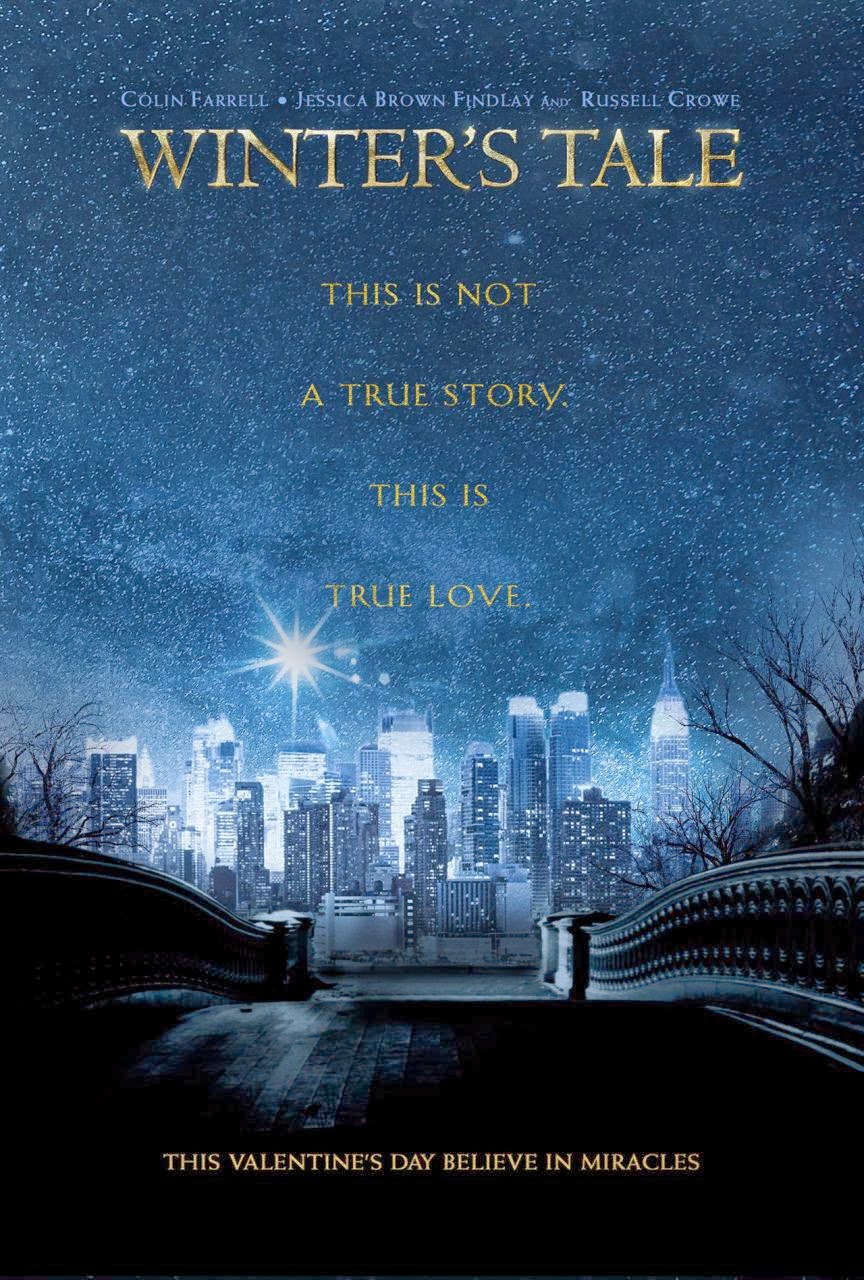Winter's Tale
If nothing else, at least Winter's Tale is not formulaic. I had no idea what was coming in each scene, and I read the book (though that was almost 30 years ago, and I have a feeling the movie makes liberal changes). It's gotten some pretty bad reviews, and I can't deny the movie is a mess, but it is so unusual and so unashamedly romantic that I admired it a little bit. It seems to be daring cynics to sneer at it.
The film was directed by Akiva Goldsman, one of the most middle-brow screenwriters in Hollywood. He has no more skill as a director than a writer, but he at least has Caleb Deschanel behind the camera, who bathes New York City in a kind of glow that reinforces its magical qualities. For in Winter's Tale, the city is place of wonders, from Central Park to the zodiac ceiling of Grand Central Station.
The story, set in 1916, concerns Peter Lake, a thief who, as a baby, was set adrift in a model ship by his parents, who were denied entrance at Ellis Island. He is raised by the king of the underworld, Pearly Soames, but Lake breaks from him, earning Soames' wrath, which means Lake is marked for death. He is saved by a white horse, which we later learn is Lake's spirit animal, and the equine leads him to his great love, a consumptive young woman.
This is just the beginning, and it will get stranger. How you feel about the movie will probably be tested when Will Smith shows up as Lucifer, wearing a Jimi Hendrix t-shirt and reading A Brief History of Time (this is 1916, remember). We get angels and demons, and henchmen wearing bowler hats, and then Lake, after being thrown off the Brooklyn Bridge, is still living in 2014, where he makes the acquaintance of reporter Jennifer Connelly and her cancer-stricken daughter.
I have no idea how audiences will respond to all this, as I can't think of another movie to compare it to. This is both good and bad--it's original, but it has no consistency of tone. The acting is kind of all over the place, too. Colin Farrell is Lake, and he leaves his usual tics behind and makes for a good hero. Russell Crowe, who as he heads into his fifties seems to be transitioning into villain roles (surely a Bond film is coming) and while he does chew the scenery, is effectively scary.
As the young consumptive, Jessica Brown Findlay is "impossibly beautiful," as Farrell describes her, but little else. Goldsman and Deschanel make excellent use of her physical attributes but she is more a collection of habits--she sleeps outside, to keep her body temperature down, she plays Brahms on the piano, she has a head of luxurious red hair--than an actual character, and Brown Findlay, as lovely as she is, doesn't make her into a living person, just an ideal.
While I wouldn't recommend this film to anyone, I didn't hate it, as at least it's not another stupid reboot, and those who like fantasy may well be enchanted.
My grade for Winter's Tale: C+.
The film was directed by Akiva Goldsman, one of the most middle-brow screenwriters in Hollywood. He has no more skill as a director than a writer, but he at least has Caleb Deschanel behind the camera, who bathes New York City in a kind of glow that reinforces its magical qualities. For in Winter's Tale, the city is place of wonders, from Central Park to the zodiac ceiling of Grand Central Station.
The story, set in 1916, concerns Peter Lake, a thief who, as a baby, was set adrift in a model ship by his parents, who were denied entrance at Ellis Island. He is raised by the king of the underworld, Pearly Soames, but Lake breaks from him, earning Soames' wrath, which means Lake is marked for death. He is saved by a white horse, which we later learn is Lake's spirit animal, and the equine leads him to his great love, a consumptive young woman.
This is just the beginning, and it will get stranger. How you feel about the movie will probably be tested when Will Smith shows up as Lucifer, wearing a Jimi Hendrix t-shirt and reading A Brief History of Time (this is 1916, remember). We get angels and demons, and henchmen wearing bowler hats, and then Lake, after being thrown off the Brooklyn Bridge, is still living in 2014, where he makes the acquaintance of reporter Jennifer Connelly and her cancer-stricken daughter.
I have no idea how audiences will respond to all this, as I can't think of another movie to compare it to. This is both good and bad--it's original, but it has no consistency of tone. The acting is kind of all over the place, too. Colin Farrell is Lake, and he leaves his usual tics behind and makes for a good hero. Russell Crowe, who as he heads into his fifties seems to be transitioning into villain roles (surely a Bond film is coming) and while he does chew the scenery, is effectively scary.
As the young consumptive, Jessica Brown Findlay is "impossibly beautiful," as Farrell describes her, but little else. Goldsman and Deschanel make excellent use of her physical attributes but she is more a collection of habits--she sleeps outside, to keep her body temperature down, she plays Brahms on the piano, she has a head of luxurious red hair--than an actual character, and Brown Findlay, as lovely as she is, doesn't make her into a living person, just an ideal.
While I wouldn't recommend this film to anyone, I didn't hate it, as at least it's not another stupid reboot, and those who like fantasy may well be enchanted.
My grade for Winter's Tale: C+.



Comments
Post a Comment